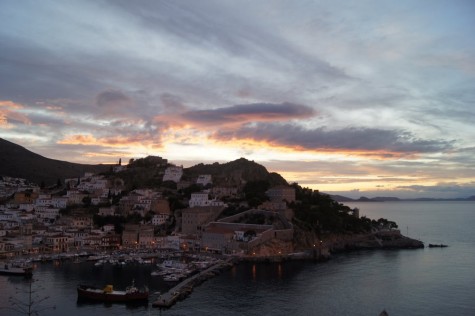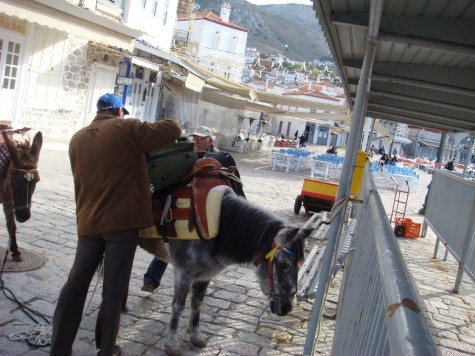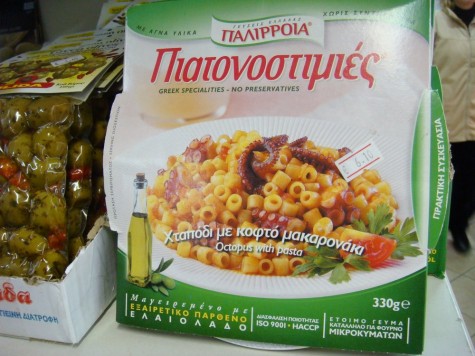
But outside, it looked like this:

The only time we took breaks was to eat. And to eat, we had to walk all the way down the hill. On Hydra, there are no cars, only donkeys. But we couldn’t call a donkey like you call a taxi. Here’s a token donkey photo:

But fortunately Greece delivers in the food department, and is perfect for two people who are too mentally distracted to think about food more than a little bit. We didn’t cook at home all that much because, even though it was winter, there were still two tavernas open and they gave us plenty of tasty things to eat every night.
The nice thing about tavernas is that they make something different each night. If you’re like me and hate the tyranny of choice, just go to Greece. You will have very few options, but they will all be good. Fried calamari the day the fishermen come in (and what calamari: so sweet, like scallops!). Beets with their greens. Lentil soup. Eggplant baked with feta.
In the grocery store, I saw this, and was baffled:

I’d never heard of this particular dish, but apparently it’s common enough that it’s available as a prefab home version. But then one day at the taverna, they had it. And now I see why it’s considered so essential–Greek comfort food, all slippery and chewy, with lots of kefalotyri on top.
Sadly, most of the other things we ate have slipped my mind. This is the thing about Greek food–such basic components, but occasionally there’s a combo that surprises in part because it’s so logical, but why didn’t you think of it before?
This is most memorable in spoon sweets I’ve had: sour cherry with rose geranium, fig with nutmeg and, on this trip, grapes with something intangible, sort of soft, strangely savory… We finally asked Matina, the woman at our top-choice taverna who had taken to squeezing us and kissing us every time we showed up, and she said, “Basil. Grapes and basil. Pick the seeds out of the grapes, cook with an equal amount of sugar, then set aside with a bunch of basil in overnight.”
We ate breakfast and lunch at home. Breakfast was fresh yogurt, sold in a nice little clay crock, and honey and, fine, some muesli for substance. Once Peter started going to the bakery, we had hard, dry, not-very-sweet breakfast cookies too.
For lunch, I took whatever veg looked good at the store and slow-cooked it in olive oil. I was feeling pretty pleased with the flat Roman beans with a little tomato. Then I made a few other things, and they were pretty good too. And then our last day we had some straggler zucchini and some leeks and some sad parsley, and not even tomato, and I wasn’t feeling so good about the whole thing, but it turned out to be the best one yet.
Slow-cooking in olive oil is really the moral of this story (or at least a more accessible one than ‘Go spend the winter on Hydra’). It is the best, easiest thing in the world. Pour about an eighth-inch of olive oil in your pot and put it on medium heat. Rinse your vegetables. Don’t bother drying them. Chop them up, plus some onion, maybe, and/or some garlic. If you’ve got herbs, chop those. Put everything in the pan with the olive oil, plus some salt and pepper. If you’ve got a little canned tomato, you can add that. Toss it around and put the lid on. When it’s simmering, turn it down to low and let it go until you look up from your writing again–45 minutes? Let cool a little. Eat with crusty bread and feta. Leave leftovers out on the stove, covered, for later room-temp snacking.